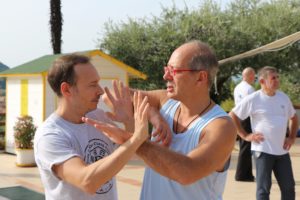by Jacopo Silicani
[The Ch’iang Shan Pa Kua Chang Association Newsletter – Vol. 2, No. 1 – 1997]
[Translated by Todisco Marina]
.[Adapted and re-edited by F. Hriadil]
My name is Jacopo Silicani. I teach Pa Kua Chang and serve as one of Master Park’s representatives in Europe. My school is located in Padova, a town in Veneto, which is near Venice in the northeastern region of Italy. I have been practicing Chinese martial arts for 13 years and have participated in many national tournaments with excellent results. Also, I attended The Fifth World Championships in Taiwan. Master Park has been my instructor for 5 years now and I would like to relate my personal story of how I came to know Master Park and find the “true path” with the hope that it might be of interest and benefit to those who are still searching.
How My Journey Began
Though Pa Kua instruction was not widely available in Italy, I began my study of the Chinese martial arts with an oriental master who taught both hard and soft styles of Kung Fu, including Pa Kua Chang. I learned about Pa Kua and obtained a deep respect for it as one of the most developed and mysterious martial arts in the world today. I studied Pa Kua under my instructor for a number of years, and eventually became a teacher of his style.
Over time, however, I started to become increasingly troubled. After years of dedicated practice, I noticed that I was no longer continuing to progress. I began to recognize that I was learning techniques but no depth, form but no substance. My doubts continued to grow and I finally came to the realization that my teacher’s style and method were incomplete. There were important elements that were missing. This not only troubled me on a personal level; I also felt a responsibility and a concern for my students.
Furthermore, my goal has always been to learn more than just the mechanics of self-defense. I have always desired to learn the moral, ethical, and spiritual aspect of the Chinese martial arts that can only come from deep understanding. Stories about great martial arts masters who were not only legendary fighters but were also very wise men have always fascinated me. In addition to teaching fighting, these masters also imparted great wisdom and spiritual insight to their disciples. This was my belief and my vision when I began my studies. Reality, however, did not come anywhere near my expectations.
I became so disappointed and disillusioned by these issues that I eventually left my original teacher. Fortunately, this painful experience did not lead me to discredit all martial arts masters, nor did it disillusion me to the extent that I quit practicing altogether. Instead, it taught me an important lesson, finally opening my eyes and my mind, which due to idealism, ego, and/or pride had been closed for far too many years.
My Search for True Pa Kua Chang
During this period of renewed searching, I decided to contact another Pa Kua Chang instructor in Italy who I had known about but never made the effort to meet. He was an experienced Pa Kua teacher who had traveled extensively throughout China and met many masters. He started me on the right path by introducing me to a publication that eventually came to be called the “Pa Kua Chang Journal.” I had heard the name of Park Bok-Nam before and, through this journal, came to learn more and more about him and his teachings. It was refreshing and exciting to see Master Park presenting specific information and concrete details not only about movement and technique, but also about the underlying theory and principles that were involved. This was completely different from the standard martial arts articles I was used to seeing that discussed only the lineage of a particular style, or the stories and legends about its various masters. Here, at last, appeared to be the missing elements that could help me progress in my study and development in Pa Kua Chang.
My Journey to America to Meet Master Bok-Nam Park
I contacted Master Park and made arrangements to fly half way around the world to meet him and study Pa Kua for one month at his school in Richmond, Virginia. My initial lessons with Master Park were lessons that I will never forget. During my first class, Master Park asked me to just watch one of his advanced student sessions. I sat there for 3 hours watching each and every movement, technique, and application as the students practiced over and over again, trying to perfect their execution. I listened to the strategies being discussed and observed the clear, scientific, and effective manner in which Master Park taught the class. This was completely different from the way I had been taught. My emotions literally welled up inside of me as I sat there and realized that, after so many years and so many obstacles, I had finally found a true master and sifu in the classic sense.
My second class was definitely much less touching and much more tiring (and humbling) than the first. Master Park began by having me perform some of the forms and exercises that I practiced and taught. He interrupted me repeatedly, having me move on to a different form or exercise, as he watched and carefully assessed my level of conditioning, coordination, execution, and control. Then, he sat me down before a blackboard and began asking me a series of questions to assess my level of understanding of the principles and concepts of Pa Kua Chang. “What is chi?” “Why and when do you sink the breath to the Tan Tien?” “Why and how do you coordinate the breathing with the movements and the exercises?” “How do you direct the chi internally?” “How do you issue the chi externally?” He asked question after question and I was unable to provide any good answers.
After it was apparent that I could not answer the questions he was posing, Master Park became very serious and inquired how I could run a school and teach Pa Kua with so little understanding. He asked me if I realized the great responsibility that a teacher has to his students. He watched me closely and listened to my response. I explained my background and that I was teaching my students according to the method I was taught. I explained, also, that after years of practice I came to recognize the incompleteness and limitations of my training and my teaching, and that was why I had journeyed to the US to meet him. After sensing my sincerity and my regret, Master Park softened his tone and said “Well, now that your heart has been opened, the lesson can begin.”
My Lessons Truly Begin
Master Park then spoke in great detail about the theory, philosophy, and general principles forming the basis of the Pa Kua Chang of Lu Shui-Tian, using many drawings and equations to present important concepts and ideas. To say this was eye-opening and mind-expanding would be an understatement. Information that had been missing from my original training came flooding into my mind at a rapid pace. In the days and weeks that followed, Master Park taught me the basic movements and techniques, and more importantly also explained the underlying principles that were involved.
Though Master Park imparted a great deal of intellectual information, he emphasized the fundamental importance of developing “body knowledge.” I had to spend a great deal of time and effort, everyday, practicing the movements (over and over again) trying to perfect their execution, and make them fluid, relaxed, and natural. Master Park stated quite directly that there were no shortcuts in achieving perfection and that training in this manner is essential.
Master Park’s method of instruction is systematic and methodical. Every movement is learned in a step-by-step manner. Students begin with basic movements and gradually, over time, progress to more complex and demanding methods that build on these basics. Master Park tailors the training program to the ability of each individual student and introduces new movements or exercises only when the student is ready.
It was quite clear from these early training sessions that Master Park also expects his students to become “thinking” practitioners. Students must focus on understanding the underlying principles in each movement and technique. They are then expected to use this knowledge to research, correct, and perfect the methods they have learned. Master Park will continue to provide guidance and instruction, as required, to aid the student in this process. However, experience has shown him that the only way a student can truly “make a movement his/her own” is through this type of guided self-study and self-discovery.
This whole approach was very different from the way I was taught by my original teacher and the way I used to teach my students. Now, when my students approach me with a question about a movement or technique, I always refer to the underlying principle and can answer their questions with confidence. This has proven to be very beneficial to me in my own development in Pa Kua and it has helped me become a better instructor for my students.
Finally, since I was already an instructor with students, Master Park also spent time talking to me about the importance of evaluating my students properly. He explained that simply assessing the students’ flexibility or checking their movement sequences is not enough. A good teacher of Pa Kua must also be able to accurately ascertain the student’s muscle, nerve, and joint responses; whether he or she is properly balancing the internal and the external in the movements; whether or not the rhythm and speed variation is correct; and much more. With this information a teacher can then individually tailor the lesson to the student’s specific mental and physical capabilities and body type.
Continuing on the True Path
That first month with Master Park was uplifting and was a time that I will remember for the rest of my life. It passed all too quickly, however, and I had to return to Italy. But, it was a turning point in my life and my career. I have continued my studies under Master Park since that time as a student, and now as a disciple. It has been five years and I have grown as a Pa Kua practitioner, as a teacher, and as a person under Master Park’s expert guidance and instruction.
I admit to feeling somewhat frustrated, at times, only because of an unrealistic desire to learn everything as quickly as possible. But, this impatience has diminished as I have matured. Nevertheless, my progress has been gradual and steady over the last five years. My senior students have told me that the quality of my instruction has definitely improved. I owe whatever compliments I have received to Master Park and his method.
Every year, Master Park comes to Italy to give seminars in Pa Kua, and to assess the students in my school. His visits always generate a great deal of enthusiasm and interest. For me, this provides the opportunity to have Master Park check to see that I am teaching my students properly and allows me to continue to study his teaching method. Also, it gives my students the opportunity to receive direct instruction from Master Park and to confirm that their movements and execution are correct.
Attendance at the seminars has grown as more people in the European martial arts community learn about Master Park. I have published translations of some of his articles on Pa Kua Chang in the number one martial arts magazine of Italy, and frequently receive phone calls or letters inquiring about Pa Kua instruction. As a result of Master Park’s visits, the Pa Kua Chang of Lu Shui-Tian is becoming increasingly well-known and highly regarded throughout Italy and Europe.
It has been a pleasure to know Master Park on a professional level, and on a personal level. Master Park is completely devoted to the study, development, and promotion of Pa Kua Chang. It would not be an exaggeration to say that Pa Kua is his life. Also, he is a kind and virtuous man with firm moral convictions, and has on more than one occasion given me advice which has helped me to overcome some difficult moments. For this, I am truly thankful. I hope that everyone interested in the martial arts will have the opportunity to come to know (as I have) this man, this teacher, and this true master of Pa Kua Chang.
Shifu Jacopo Silicani

Shifu Jacopo Silicani has studied Qiang Shan Ba Gua Zhang with Master Bok Nam Park since 1992. He is currently teaching in Padova, Italy. You can learn more about his school and classes at https://pa-kua.it

